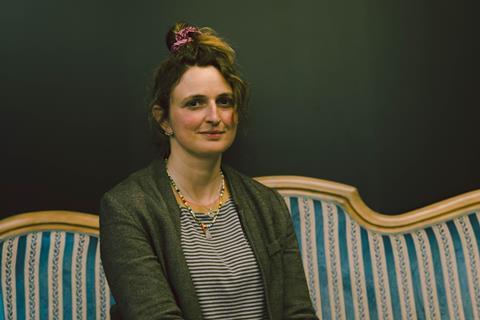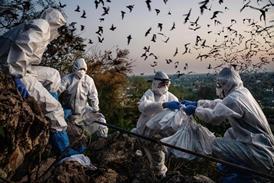
In the final days of the Geneva edit of her fourth fiction feature La Chimera, set for Cannes Competition, Italian director Alice Rohrwacher sat down at Visions du Reel for an expansive look at her career to date.
Her recent filmography includes an Oscar-nominated short film (The Pupils in 2022), a documentary (Futura, 2021) and signing on for two episodes of a large-budget HBO TV show (My Brilliant Friend). They follow the loosely-connected, occasionally-autographical features which have dazzled audiences, from Corpo Celeste to The Wonders and Happy As Lazzaro.
La Chimera, which stars UK actor Josh O’Connor alongside Rohrwacher’s sister Alba, Carol Duarte and Isabella Rossellini, will not continue an autobiogaphical thread, although it shot in Rohrwacher’s native Tuscany. It was born out of lockdown, explained Rohrwacher, and years of research. ‘It’s a film that talks about our relationship with the past and with the dead and was written at a time of death, when death became part and parcel of our lives and it became necessary to make this film,” she explains. “If I don’t have a necessity, I can’t do it.”
La Chimera is under wraps until Cannes, but, has been described as a drama set in the 1980s around the clandestine world of tomb robbers, with O’Connor playing an archaeologist who becomes caught up in it. A24 has US rights and The Match Factory is handing international sales. It’s a new arena for Rohrwacher, who wrote and is also co-editing. “We’re on the last few days of editing,” she said. “And when you edit, you rewrite the film, you open it up with the sound and the shots and free the film from the narrative element. I love editing. You come from a shoot which is chaotic into a place of contemplation.”
Nervous, as always, about releasing her film into the world at Cannes, Rohrwacher said La Chimera also marks a new type of collaboration with her sister Alba. “It is different than what we have done in the past. But she’s the one I will go to, if I need advice she is the one who will tell me the awful truth.” They do argue, she noted. “But we love each other so much we are free to hate each other because our love is stronger,”, she added.
Starting with Corpo Celeste, Rorwacher - who first worked on a documentary and whose films can seem to straddle disciplines - has often dealt with elements of her very specific life story in a way that has been universally acclaimed. She grew up, like the protagonists of The Wonders, on a bee farm and her parents (including a German father) did move the family to an abandoned house in the Tuscan countryside - “a political act to be self-sufficient”. The sharecroppers, or abused tenant farmers in the mystical Happy As Lazzaro, also shot in Tuscany, were based on real-life events familiar to and researched by Rohrwacher. And she says that film-making, for her, is a political act.
“Films must give you something to digest, even if it’s difficult, even if it’s fear. Fear is powerful, it can be dangerous, and you can use it for good or bad. I live in the country and it’s a struggle where gigantic industry is trying to change the earth itself, the ground, to see It as a money-making tool, not a place for life,” she said.
La Chimera will also speak to the land, past and present. “Landscapes are very important to me but I don’t think of them when I write the story, I find them after. They are our collective history. They tell a story across different levels, and with this new film, it’s a place where the past and the present live side by side.”
She added: “It’s truth we’re talking about, whether it’s a documentary or fiction, we’re talking about films that create a certain sort of independence. Fiction or reality, the aim is to find some truth, to awaken intelligence in people.”
That’s why, she explains, her film-making process can be slower. “Even if an actor wants to meet with you, to work with you, you can’t do it unless here’s a necessity. I don’t always make films which come from myself - sometimes it’s a book, but always it’s a necessity, making that necessity into a virtue.”
The one exception to that has been the two episodes she shot for HBO of Elena Ferrante’s My Brilliant Friend, a lavishly-funded experience for a filmmaker who has worked in smaller budgetary confines, with her films produced Carlo Cresto-Dina and his Tempesta company. “There I could work without feeling the responsibility of the story, concentrate on the images and the actors.” Bringing over her DoP Helene Louvart, with whom she says she has a ‘fusional relationship’, “we were free. It was fascinating. When they proposed other projects I said no, that’s enough, though. A very interesting experience, but I don’t feel the need to repeat it.”

























No comments yet